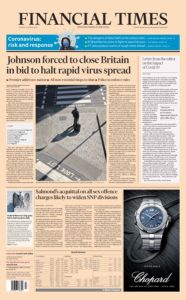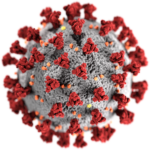 The current pandemic crisis is going to have a deeper impact on the way we live, the way we think, and the way we do politics than 9/11 and even the 2008 financial crash, according to the FT’s Edward Luce.
The current pandemic crisis is going to have a deeper impact on the way we live, the way we think, and the way we do politics than 9/11 and even the 2008 financial crash, according to the FT’s Edward Luce.
But does the coronavirus threaten democracy?
Even during a pandemic, we must be vigilant and critical of slides towards authoritarianism. That’s why it is encouraging to see bodies like the Council of Europe call out Hungary for its concerning state of emergency, notes Flora Holmes, a Researcher at the British Foreign Policy Group.
It is vitally important that citizens, and civil society organisations, continue to critically assess government’s responses to the crisis, and hold leaders to account where possible. If we don’t, we might find ourselves living in a more authoritarian world once the pandemic is over, she contends.
Freedom House is recommending a set of democratic principles for governments to respect in responding to the coronavirus pandemic, including election integrity:
Every feasible step should be taken to protect the administration of free and fair elections, including by adjusting voter-registration rules and polling-station procedures, encouraging early voting, and allowing vote-by-mail or other remote voting procedures where their integrity can be assured. Postponement of elections should only be a last resort, and should be supported by law and a broad consensus among political forces and independent experts.
 “In this time of crisis, it is crucial that any government measures intended to stop the virus’s spread be transparent, necessary, proportionate, grounded in law, and nondiscriminatory,” said Mike Abramowitz, Freedom House president. “Urgent action to combat the pandemic should not become a pretext for political power grabs or illegitimate and unlawful restrictions on fundamental rights. Democracy should not and need not be sacrificed in the name of public health.”
“In this time of crisis, it is crucial that any government measures intended to stop the virus’s spread be transparent, necessary, proportionate, grounded in law, and nondiscriminatory,” said Mike Abramowitz, Freedom House president. “Urgent action to combat the pandemic should not become a pretext for political power grabs or illegitimate and unlawful restrictions on fundamental rights. Democracy should not and need not be sacrificed in the name of public health.”
The “states of emergencies” being called in many countries should be proportional and as limited as possible in time and geographic reach as possible, says Michael Meyer-Resende, the executive director of Democracy Reporting International. But many governments ignore such limitations, he writes:
 In Hungary the government proposes a carte blanche law under which the government could do whatever it thinks it needs to do for as long as it wants to do so. Criminal sanctions can be imposed for public statements that can ‘create confusion’.
In Hungary the government proposes a carte blanche law under which the government could do whatever it thinks it needs to do for as long as it wants to do so. Criminal sanctions can be imposed for public statements that can ‘create confusion’.
Compare that to Portugal, which also called a state of emergency. The decree is limited to 14 days and lists in great detail what the government can do during this period. It explicitly states that freedom of expression cannot be restricted in any way.
Free and independent media are also essential democratic bastions, according to @Bill_McKenzie, Editorial Director of @thebushcenter journal, The Catalyst: A Journal of Ideas. from the Bush Institute.
Democracy assistance groups like the National Democratic Institute (NDI) – a core institute of the National Endowment for Democracy (NED) – are working with parliaments to ensure they respect civil liberties as they consider taking urgent legislative action in response to the crisis, and partnering with local officials on how to effectively respond to citizen needs at this critical time, notes NDI president Derek Mitchell. Even as some authoritarian regimes risk lives by withholding information and denying the reality of the crisis, our partners are already rising to the moment, and creatively adapting to ensure our programs to elevate citizen voices continue forward.
When #SriLanka declared a curfew because of #COVID19 the @SolidarityCntr staff there prepared and distributed an online graphic (above) in English, Tamil & Sinhala with tips for workers during the crisis.
The steps we take to respond to the pandemic and mitigate its fallout will determine the trajectory of democracies for decades to come. Our adversaries are already attempting to shape this future, writes @cepa’s @apolyakova #CommonCrisis







